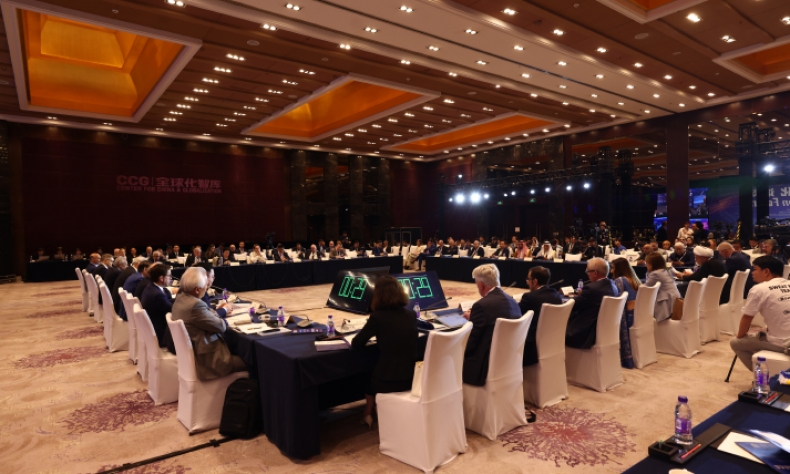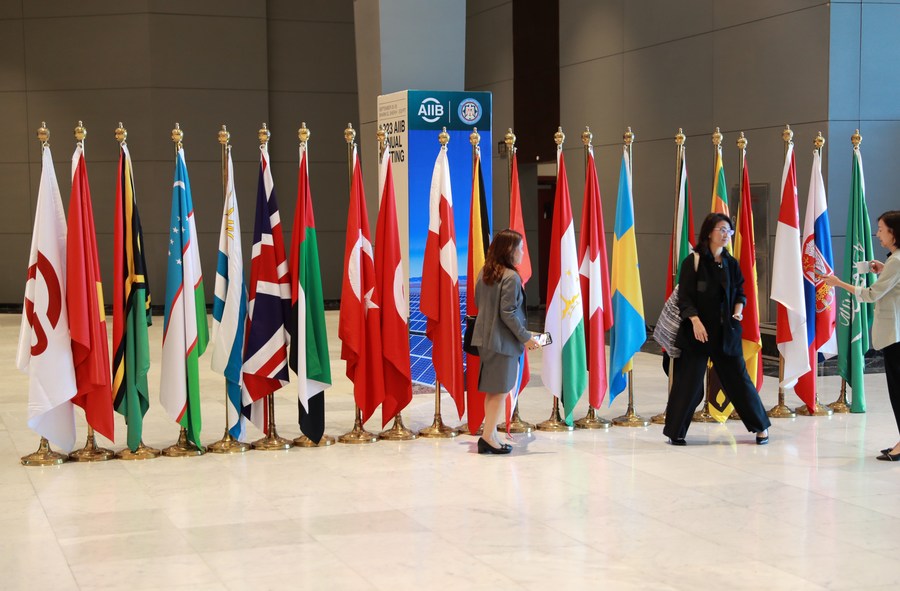Beijing Forum Seeks New Paths to Peace and Development

By upholding the United Nations Charter and practicing true multilateralism, it is still possible to steer global governance toward a more just and reasonable direction.
“Globalization has brought prosperity, peace and development since the end of the Cold War. However, globalization now faces significant challenges, making it less attractive than it once was,” said Wang Huiyao, President of the Center for China and Globalization (CCG), a think tank based in Beijing, during his opening remarks at the 10th China and Globalization Forum in Beijing on May 25.
Wang stressed that globalization has faced several predicaments over the past decade as the world has found itself in the throes of humanitarian and economic crises deepened by geopolitical conflicts and the trials and tribulations brought on by climate change.
The forum, which took place from May 25 to 26, was co-hosted by CCG and the China-United States Exchange Foundation, with the support of the Academy of Contemporary China and World Studies (ACCWS), an affiliate of the China International Communications Group (CICG). The event gathered nearly 300 participants from more than 50 countries and regions. Discussions focused on current challenges in global governance, aiming to foster consensus on global peace, development and intercultural understanding.
Confusion and determination
Since 2016, the ACCWS and the School of Political Science of East China University of Political Science and Law have jointly released the annual States’ Participation Index of Global Governance Report. This report evaluates globalization trends along with the involvement and contributions of 189 countries in global governance. Recent findings have indicated a sharp rise in anti-globalization sentiment, heightened trade and investment protectionism, as well as increasing economic tensions.
“Although there have always been international disputes about the future trends and effects of globalization, current situations in world trade, cross-border investments, and personnel mobility constitute huge obstacles to globalization, making the calls for ‘de-globalization’ louder and more frequent,” said Yu Yunquan, CICG Vice President and ACCWS President, at the opening of the forum.
In Yu’s view, the international strategic community exhibits a conflicted mentality of “confusion” and “determination” regarding the future trajectory of globalization. This confusion stems from the rise of emerging market countries, the complexity and inconsistency of current geopolitical circumstances, and the rapid pace of technological advancements, such as the rise of artificial intelligence (AI), which exacerbate issues such as economic inequality and cultural conflict. With no prior experience to guide, the prospects of globalization give rise to a sense of puzzlement and unease.
Despite this confusion, there is a strong determination rooted in the belief that globalization remains an irreversible trend, with the fundamental need for win-win cooperation in international society unchanged, according to Yu. By upholding the United Nations Charter and practicing true multilateralism, it is still possible to steer global governance toward a more just and reasonable direction, he added.

International experts attending the forum recognized the simultaneous presence of confusion and determination in the global arena. “What we see in the United States, we see in Europe and elsewhere, is essentially a return to the past of closing markets, reversing collaboration, and fear of international economic relations. We observe this with old products like steel and with new products like electric vehicles,” said Doug Bandow, senior fellow at the Cato Institute, an American think tank headquartered in Washington, D.C., during the forum’s first roundtable discussion.
Justin Vaïsse, founder and Director General of the Paris Peace Forum and former Director of Policy Planning at the French Ministry of Foreign Affairs, acknowledged some positive developments in international cooperation—despite the growing divide. He cited the approval of the Kunming-Montreal Global Biodiversity Framework, which was adopted at the 15th Conference of Parties to the UN Convention on Biological Diversity in Montreal, Canada, on December 19, 2022. The framework committed 196 countries to tackling global loss of biodiversity.
He also mentioned the UN’s first resolution on AI, which was adopted in March to promote “safe, secure and trustworthy” AI systems. The resolution was jointly proposed by China and the U.S. and agreed upon by all UN member states.
“The situation is bad, but there is still hope in the system,” he noted.
The solution
While globalization is primarily viewed as an economic process, it has now entered a period of decline characterized by both an economic recession and, perhaps more importantly, a geopolitical downturn.
At the forum, Vuk Jeremić, former Serbian Minister of Foreign Affairs, shared his insights on this phenomenon. Jeremić, currently President of the Center for International Relations and Sustainable Development, a public policy think tank based in Belgrade, Serbia, and New York City, emphasized that the realm of geopolitics, like that of economics, experiences cycles of rise and fall, albeit over longer periods. According to him, the world is currently in a prolonged geopolitical downturn, having endured 10 years of recession in this domain, with the bottom yet to be reached.
Jeremić identified three monopolies in the world order led by the U.S. that are being challenged: the monopoly on force, the monopoly on the U.S. dollar, and the monopoly on technology.
In the face of the current fractures in global governance and globalization, what measures can be taken to bridge these divides? According to Steve Howard, founder and Secretary General of The Global Foundation, an Australia-based organization, one key approach is to allow other countries more room for development. He cited China as an example, showcasing what he termed “cooperative globalization.”

Howard highlighted the Asian Infrastructure Investment Bank (AIIB). Established at China’s initiative in 2016, the AIIB started with 57 founding member countries and has since expanded to include 109 members worldwide. It is a multilateral development bank that provides sustainable infrastructure financing for low-income countries and seeks solutions to global challenges, in turn reflecting new trends in globalization and multilateralism.
At the Budapest Eurasia Forum 2023, Andrew Cross, Chief Financial Officer of the AIIB, shared some statistics: As of late 2023, the AIIB had approved 253 projects, amounting to more than $50.67 billion in investments. These projects span many sectors, including transportation, energy, healthcare and education.
Furthermore, cooperation under the framework of the Belt and Road Initiative, a China-proposed initiative to boost connectivity along and beyond the ancient Silk Road routes, continues to grow. In 2023, Chinese companies made non-financial direct investments totaling 224.09 billion yuan ($31.8 billion) in Belt and Road partner countries, a 22.6-percent increase from 2022. It was believed this surge in investment underscores the expanding reach and impact of cooperative globalization initiatives.
At the forum, several prominent diplomats, including EU Ambassador to China Jorge Toledo, German Ambassador to China Patricia Flor and Turkish Ambassador to China Ismail Hakki Musa, highlighted the upcoming Summit of the Future in September. The official UN website describes the summit, proposed by UN Secretary General António Guterres, as “a once-in-a-generation opportunity to enhance cooperation on critical challenges and address gaps in global governance.”
Guterres, speaking at a ministerial preparatory meeting in September 2023, emphasized that a multipolar world is emerging, offering opportunities for different countries to take on leadership roles. However, he cautioned that history has shown that a multipolar world without robust multilateral mechanisms can pose serious risks to global peace and security, potentially leading to heightened geopolitical tensions, disorderly competition, and deeper divisions.
Guterres stressed that only multilateral mechanisms with broad universal support have true vitality. He described the Summit of the Future as a unique opportunity to rebuild trust and reform outdated multilateral frameworks, crucial for reducing risks and promoting global peace and security.
China’s deputy permanent representative to the UN, Geng Shuang, also commented on the September summit at an event commemorating the annual International Day of Multilateralism and Diplomacy for Peace at the UN headquarters on April 24. He said China looks forward to the summit as a reaffirmation of commitment to the UN Charter and a revitalization of confidence in multilateralism.
“The only right path forward in the face of many global challenges is to uphold and practice true multilateralism,” Geng affirmed.
 Facebook
Facebook
 Twitter
Twitter
 Linkedin
Linkedin
 Google +
Google +










